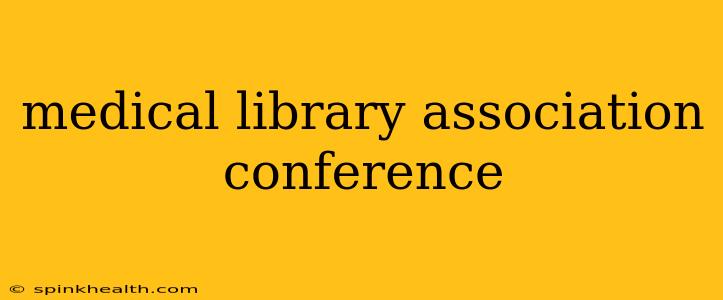The Medical Library Association (MLA) conference isn't just another gathering; it's a vibrant ecosystem where the brightest minds in health information science converge. Imagine a bustling marketplace of ideas, a whirlwind of networking opportunities, and a deep dive into the future of medical librarianship. That's the MLA conference experience, and this guide will unravel its intricacies and help you navigate this exciting event.
What is the MLA Annual Conference?
The MLA Annual Conference is the flagship event of the Medical Library Association. It's a multi-day affair packed with educational sessions, workshops, poster presentations, and networking events. Think of it as a massive intellectual buffet, offering a diverse menu of topics relevant to medical librarians, health informaticists, and anyone working at the intersection of health information and technology. Each year, the conference focuses on a central theme, providing a framework for the diverse presentations and discussions.
Who Attends the MLA Conference?
The MLA conference attracts a diverse crowd. You'll find medical librarians from academic institutions, hospitals, government agencies, and private companies. Health informaticists, data scientists, and technology professionals also play a significant role. Students and early-career professionals make up a considerable portion of attendees, eager to learn from seasoned experts and forge connections within the field. In short, if you're involved in any facet of health information, the MLA conference is a place you'll want to be.
What are the Key Highlights of the MLA Conference?
The conference is brimming with highlights, making it challenging to single out the best. However, consistently praised aspects include:
- Educational Sessions: These provide in-depth explorations of current trends and challenges within medical librarianship. Topics range from data management and digital literacy to evidence-based practice and health equity.
- Networking Opportunities: The conference is a powerhouse for professional networking. From informal coffee chats to structured networking events, you'll have ample chances to connect with colleagues, mentors, and potential collaborators.
- Poster Presentations: These offer a glimpse into ongoing research and innovative projects within the field. It's a great way to see the cutting edge of medical librarianship in action.
- Exhibit Hall: Vendors showcasing the latest technologies and resources relevant to medical librarianship gather in the exhibit hall. This is a great place to discover new tools and learn about upcoming trends.
What are the benefits of attending the MLA Conference?
Attending the MLA conference offers a multitude of benefits:
- Professional Development: Stay current with the latest advancements in medical librarianship and health information science.
- Networking: Build connections with colleagues, mentors, and potential collaborators.
- Career Advancement: Gain exposure to new opportunities and enhance your professional profile.
- Access to Resources: Discover new technologies, resources, and tools.
- Community Building: Connect with a vibrant community of professionals dedicated to improving access to health information.
How can I get the most out of the MLA Conference?
To make the most of the MLA conference, plan ahead:
- Review the Conference Program: Identify sessions and events that align with your interests and professional goals.
- Network Strategically: Make a conscious effort to meet new people and engage in meaningful conversations.
- Participate Actively: Ask questions, share your insights, and contribute to discussions.
- Take Notes: Document key takeaways from sessions and presentations.
- Follow Up: Connect with people you met at the conference on LinkedIn or other professional platforms.
What topics are usually covered at the MLA conference?
The specific topics vary yearly, but common threads often include:
- Health Informatics: The application of technology and information science to healthcare.
- Data Management and Analysis: Methods for organizing, analyzing, and interpreting health data.
- Digital Libraries: The role of digital libraries in providing access to health information.
- Evidence-Based Practice: The use of research evidence to inform clinical decision-making.
- Health Equity: Addressing disparities in access to health information and services.
The MLA conference is more than just a conference; it's an experience, a journey into the heart of health information science. It's a place to learn, connect, and contribute to a field that is constantly evolving. By understanding its structure and planning your attendance strategically, you can truly unlock its potential and emerge a more informed, connected, and empowered professional.

